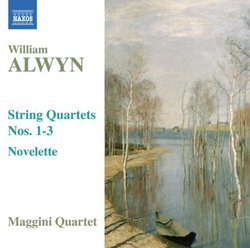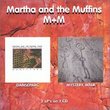| All Artists: William Alwyn Title: William Alwyn: String Quartets Nos. 1-3; Novelette Members Wishing: 0 Total Copies: 0 Label: Naxos Original Release Date: 1/1/2008 Re-Release Date: 11/18/2008 Genre: Classical Styles: Chamber Music, Historical Periods, Classical (c.1770-1830) Number of Discs: 1 SwapaCD Credits: 1 UPC: 747313056071 |
Search - William Alwyn :: William Alwyn: String Quartets Nos. 1-3; Novelette
CD DetailsSimilar CDs |
CD ReviewsAlwyn in a Personal Mode J Scott Morrison | Middlebury VT, USA | 02/02/2009 (5 out of 5 stars) "William Alwyn (1905-1985) is generally known more for his sweeping movie scores or his romantic symphonies. And his piano music has a certain larger than life feel. The three string quartets, on the other hand, are intimate and personal. He wrote twelve or more quartets before he allowed one to be published as his First Quartet, which was premiered in 1954. It is in the usual four movements. The first movement, Moderato e grazioso, is influenced by the music of Dvorák and Smetana, as is, in fact, the rest of the quartet. It begins with a forceful idea that has the main melodic shape passed between first violin and cello. This is superseded by a sad and mysterious section that brings the movement to an abrupt end. The scherzo, Allegro molto, is a dancing, elusive movement that passes by quickly with a winsome smile. The Adagio is the emotional heart of the quartet. After a darkly grave opening it has a gorgeous middle section in which the muted lower strings accompany an ethereally lovely violin melody. This movement, like the first, ends abruptly and mysteriously. The Finale, Allegro vivace, molto ritmico, is characterized by a driving rhythmic frenzy supporting an anguished outpouring, what I hear as personal pain of some sort. After a brief island of serenity there is a fervent climactic coda.
The Second Quartet, written in 1975 after twenty years silence in the quartet genre, is subtitled 'Spring Waves', the latter taken from Turgenev's novel of that name in which occur the lines, the quartet's epigraph: My careless years, My precious days, Like the waters of springtime, Have melted away. Obviously Alwyn, then seventy, was feeling his own careless and precious days slipping away. This quartet is more astringent and spare than the First. It has much more abrasive harmonies, with obsessive use of chords containing minor seconds. The first movement, Moderato, is full of 'high hopes and romantic illusions' but ends, sempre lento, in 'resignation and disillusionment'. The second, Allegro scherzando, is rhythmically more energetic and contains some reminiscence, in more clearly lyrical passages, of the loves and hopes of youth but 'seen through a glass darkly.' The pessimistic third and final movement, Adagio, limns, in the composer's words, 'the daunting prospect of old age', as reflected in a bleak fugue. It is interrupted briefly by a return of passion, but the fugue returns to conclude with a brief attempt at conquest of the inevitable. This is not an easy quartet to love, but it is a powerful statement in abstract terms of the composer's struggle with the emotional grip of old age. The two-movement Third Quartet, from 1984, is Alwyn's last major work. It was begun after the composer had attended the recording of the first two quartets by the Quartet of London. The multi-section first movement, Allegro molto, passes from its forceful and dissonant opening to a more lyrical section led by the viola. These two ideas are developed together before the driving percussive opening returns. This pattern is repeated in varied form before a sudden, abrupt ending that catches one by surprise. The Adagio finale, lasting almost thirteen minutes, is primarily elegiac in tone. It opens with pianissimo time-standing-still section that gradually accelerates and crescendos into a waltz which has a lyrical first violin theme accompanied by pizzicato lower strings. The pattern is then reversed until the movement has returned to the quiet, serene mood of its opening measures. The CD concludes with a two-and-a-half minute morceau, 'Novelette', from 1938. It was written at the request from the Oxford University Press for an 'easy' quartet movement, to be published along with similar works by other composers. It opens vigorously with what sounds like a fugato subject which is, however, never quite fugued. It has a baroquish feel nonetheless. There is a slower melodic middle section before a return to the opening melody in the first violin, this time with a musette accompaniment. After a brief return to the mood of the middle section there is, as many times earlier in this CD, an abrupt end. The Maggini Quartet, led by the marvelous violinist Lorraine McAslan, has made a name for themselves championing the works of British composers, and on Naxos have recorded, to universal acclaim, the ten so-called 'Naxos Quartets' of Sir Peter Maxwell Davies. I have not heard any other recordings of the Alwyn quartets and thus cannot compare them with the Maggini effort, but I came away from this CD, after a number of hearings created increasing appreciation for the music, with very high regard for this group. Scott Morrison" |





